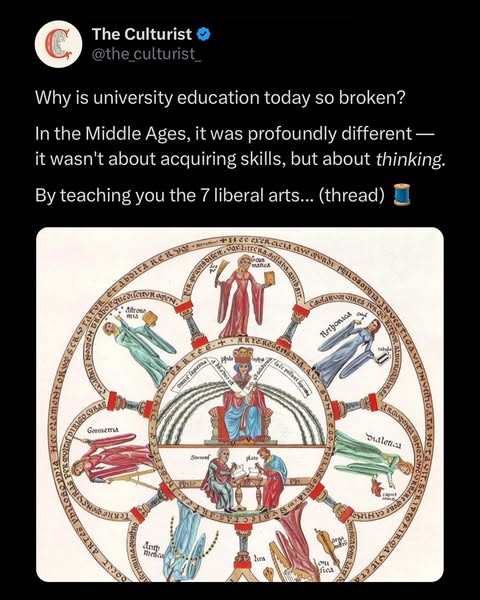Freeing the mind
I've been thinking about thinking, and thinking it's time we thought differently
I love learning. I love experiencing it personally and seeing it in others — development and fulfilling potential.
So, education matters. But perhaps not for the reasons you think.
The assault on universities by authoritarian governments is egregious and impactful if allowed to succeed. It’s straight from the authoritarian playbook to come down hard on universities. Goodness me, authoritarian governments can’t have people thinking for themselves.
Opportunities to learn should be accessible, provoke thought, challenge narratives and offer a space to debate different perspectives.
Speaking personally, I feel like my ability to think for myself is diminishing — I’m losing the art of thinking. I’ve lost my confidence in how I think, looking to people in the media whose thinking I admire, before deciding on a position.
Critical thinking is more important than ever in this age of spoon-fed outrage, controversy and being told how to think. So, when I came across this Instagram post by The Culturist, my brain felt immediately liberated. Yes! This is it! Click to read the original post or read the edited transcript below:
Why is university education so broken?
In the Middle Ages, it was profoundly different — it wasn’t about acquiring skills, it was about thinking.
By teaching you the 7 liberal arts.
Ancient and medieval societies had a vastly different idea of what higher education should be. It wasn’t about readiness for work, but cultivation of the moral and intellectual virtues that free the mind. From the 12th century, a standard university course consisted of 7 liberal arts: 3 humanities (the trivium) and 4 sciences (the quadrivium). These weren’t exactly subjects in and of themselves, but modes of learning.
What was “liberal” about them?
They were the kind of thing studied by free men, as opposed to strictly practical education (cooking, agriculture, toolmaking, etc.) for servī, “slaves.” “Free men” were able to gain knowledge that wasn’t for a pre-defined purpose — but instead to transform them personally. Music was studied not for its practical uses, but for its effects on purifying the soul.
A medieval university course first taught you the trivium: grammar, dialectic, rhetoric. These were tools for later learning; to free your mind so you can think. Since all knowledge is conveyed through language, you must learn that first …
After that, you’re ready for the quadrivium: arithmetic, geometry, music, astronomy. Why were they grouped as sciences? Because ancient thinkers believed the universe was bound by a mathematical harmony (including music) …
After all this, your mind was ready for philosophy and the higher faculties: law, medicine and theology. Theology was considered the highest, and studying it would culminate in a complete Christian education.
This is where I experienced a visceral opening of the mind:
The key difference back then was to see education not simply as a set of disciplines to gain factual knowledge from. Subjects instead worked together on a journey to free the mind — preparing it above all in the process of thinking…
So, no matter what people went on to do, their minds had all been trained in the same rigorous basics of thought.
It was about development. How liberating would that be — to go to university to learn how to think, and to learn for the joy of learning? To vigorously debate, reason, opine, and consider others’ ideas. And given where we are now, with mainly businessmen, grifters and deal-doers in office around the world, you can see the effects of this change in the purpose of education. Now, education is about your value to society’s productivity.
It’s all about the deal.
It’s all about making bank.
It’s also why we can’t have reasoned, rational debates with each other about thorny issues.
According to Plato:
For a young man is a sort of puppy who only plays with an argument; and is reasoned into and out of his opinions every day.
He soon begins to believe nothing.
Doesn’t that sound familiar?
Of course, the time wasn’t great for women. Few female philosophers are recognised in history, and access to education for women was minimal.
But how wonderful it would be if we could move on from the productivity-obsessed industrial complex and skills acquisition that capitalism brought to attend university (or any course) to simply learn to think and free the mind?
This morning, I signed up for a philosophy course.
I feel cleverer already.
Arohanui

